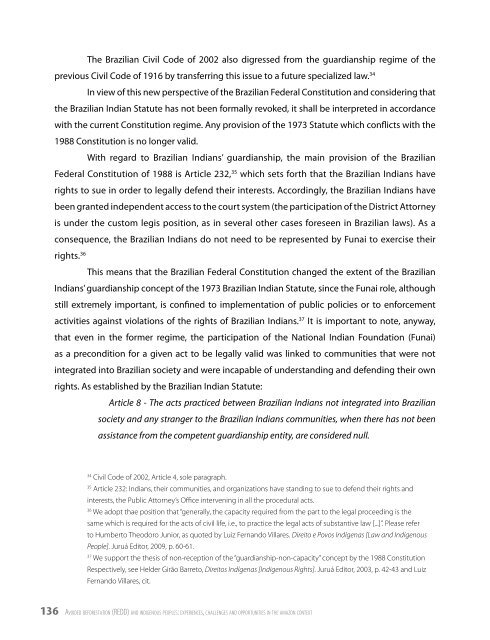Avoided Deforestation (REDD) and Indigenous ... - Amazon Fund
Avoided Deforestation (REDD) and Indigenous ... - Amazon Fund
Avoided Deforestation (REDD) and Indigenous ... - Amazon Fund
You also want an ePaper? Increase the reach of your titles
YUMPU automatically turns print PDFs into web optimized ePapers that Google loves.
The Brazilian Civil Code of 2002 also digressed from the guardianship regime of the<br />
previous Civil Code of 1916 by transferring this issue to a future specialized law. 34<br />
In view of this new perspective of the Brazilian Federal Constitution <strong>and</strong> considering that<br />
the Brazilian Indian Statute has not been formally revoked, it shall be interpreted in accordance<br />
with the current Constitution regime. Any provision of the 1973 Statute which conflicts with the<br />
1988 Constitution is no longer valid.<br />
With regard to Brazilian Indians’ guardianship, the main provision of the Brazilian<br />
Federal Constitution of 1988 is Article 232, 35 which sets forth that the Brazilian Indians have<br />
rights to sue in order to legally defend their interests. Accordingly, the Brazilian Indians have<br />
been granted independent access to the court system (the participation of the District Attorney<br />
is under the custom legis position, as in several other cases foreseen in Brazilian laws). As a<br />
consequence, the Brazilian Indians do not need to be represented by Funai to exercise their<br />
rights. 36<br />
This means that the Brazilian Federal Constitution changed the extent of the Brazilian<br />
Indians’ guardianship concept of the 1973 Brazilian Indian Statute, since the Funai role, although<br />
still extremely important, is confined to implementation of public policies or to enforcement<br />
activities against violations of the rights of Brazilian Indians. 37 It is important to note, anyway,<br />
that even in the former regime, the participation of the National Indian Foundation (Funai)<br />
as a precondition for a given act to be legally valid was linked to communities that were not<br />
integrated into Brazilian society <strong>and</strong> were incapable of underst<strong>and</strong>ing <strong>and</strong> defending their own<br />
rights. As established by the Brazilian Indian Statute:<br />
Article 8 - The acts practiced between Brazilian Indians not integrated into Brazilian<br />
society <strong>and</strong> any stranger to the Brazilian Indians communities, when there has not been<br />
assistance from the competent guardianship entity, are considered null.<br />
34 Civil Code of 2002, Article 4, sole paragraph.<br />
35 Article 232: Indians, their communities, <strong>and</strong> organizations have st<strong>and</strong>ing to sue to defend their rights <strong>and</strong><br />
interests, the Public Attorney’s Office intervening in all the procedural acts.<br />
36 We adopt thae position that “generally, the capacity required from the part to the legal proceeding is the<br />
same which is required for the acts of civil life, i.e., to practice the legal acts of substantive law [...]”. Please refer<br />
to Humberto Theodoro Junior, as quoted by Luiz Fern<strong>and</strong>o Villares. Direito e Povos Indígenas [Law <strong>and</strong> <strong>Indigenous</strong><br />
People]. Juruá Editor, 2009, p. 60-61.<br />
37 We support the thesis of non-reception of the “guardianship-non-capacity” concept by the 1988 Constitution<br />
Respectively, see Helder Girão Barreto, Direitos Indígenas [<strong>Indigenous</strong> Rights]. Juruá Editor, 2003, p. 42-43 <strong>and</strong> Luiz<br />
Fern<strong>and</strong>o Villares, cit.<br />
136 Av o i d e d d e f o re s t A t i o n (redd) A n d i n d i g e n o u s p e o p l e s: experiences, chAllenges A n d o p p o r t u n i t i e s in t h e A m A zo n c o n t e x t
















